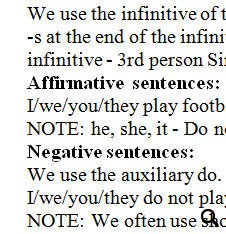FORM OF THE SIMPLE PRESENT
We use the infinitive of the verb. In the 3rd person Singular (he, she, it - or a name) we put an -s at the end of the infinitive.
infinitive - 3rd person Singular (he, she, it) infinitive + (-s , -es, -ies )
Affirmative sentences:
I/we/you/they play football. He/she/it plays football.
NOTE: he, she, it - Do not forget the -s.
Negative sentences:
We use the auxiliary do.
I/we/you/they do not play football. He/she/it does not play football.
NOTE: We often use short forms in negative sentences in the Simple Present:
I/we/you/they don't play football. He/she/it doesn't play football.
Questions:
Do I/we/you/they play football? Does he/she/it play football?
Fill in the blanks with the suitable verbs.
We use the infinitive of the verb. In the 3rd person Singular (he, she, it - or a name) we put an -s at the end of the infinitive.
infinitive - 3rd person Singular (he, she, it) infinitive + (-s , -es, -ies )
Affirmative sentences:
I/we/you/they play football. He/she/it plays football.
NOTE: he, she, it - Do not forget the -s.
Negative sentences:
We use the auxiliary do.
I/we/you/they do not play football. He/she/it does not play football.
NOTE: We often use short forms in negative sentences in the Simple Present:
I/we/you/they don't play football. He/she/it doesn't play football.
Questions:
Do I/we/you/they play football? Does he/she/it play football?
Fill in the blanks with the suitable verbs.
